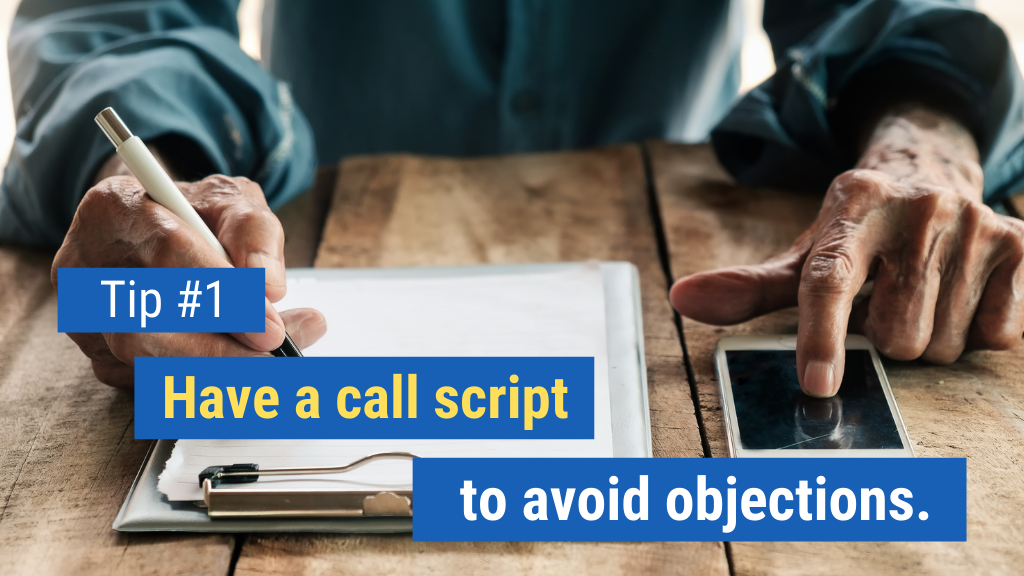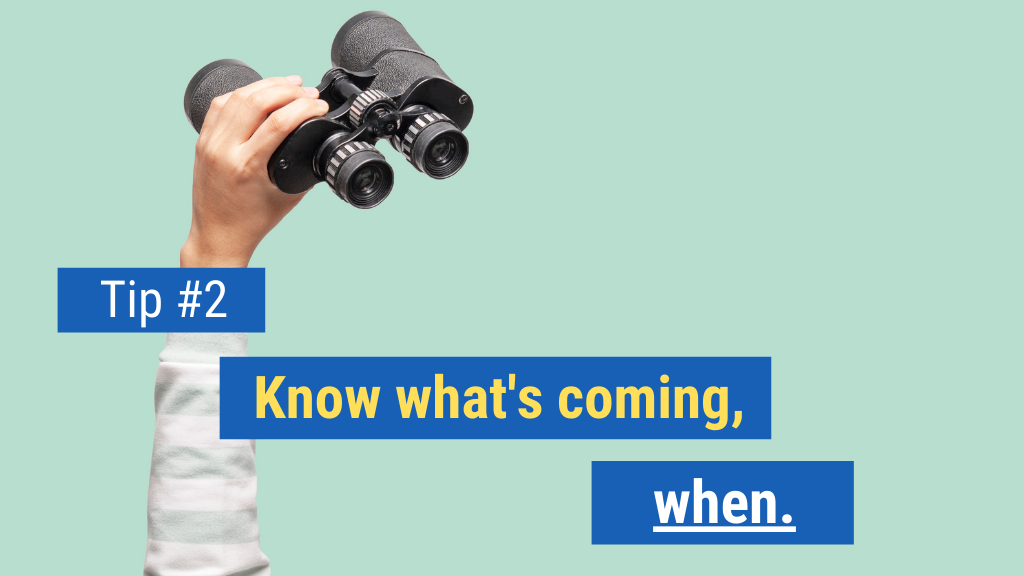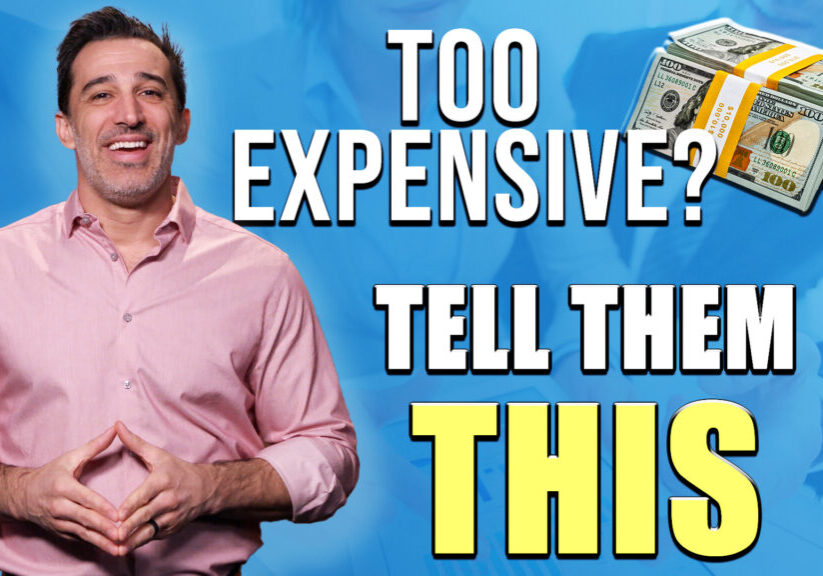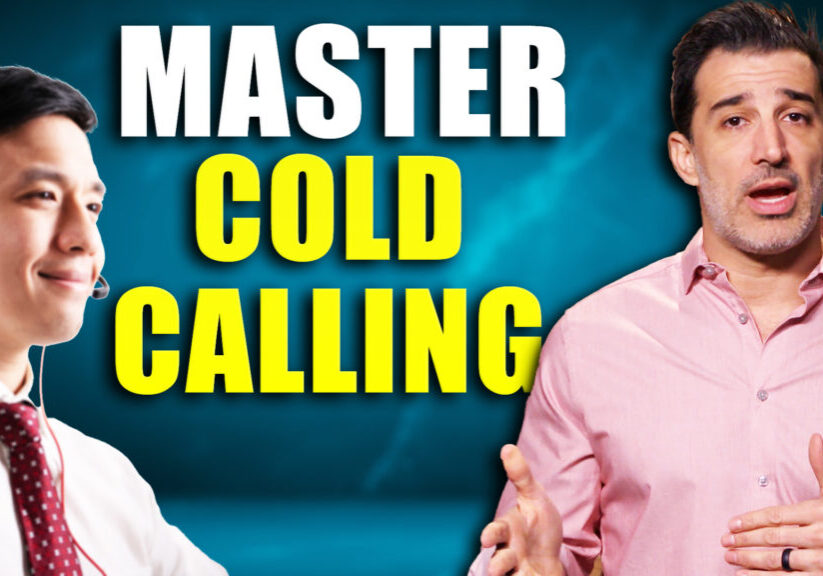If you’re making cold calls—or any type of prospecting call, for that matter—chances are you’re dealing with a lot of objections.
And that resistance is perfectly fine. In fact, cold calling objections are just a natural part of making dials.
Just put yourself in the shoes of one of your prospects…
They receive a phone call from a total stranger. Of course they’re going to push back and have objections, trying to get off the phone as quickly as possible.
It’s human nature.
Top salespeople aren’t afraid of cold calling objections; they actually embrace whatever objections come their way. They’re prepared for them.
In this video, I’m going to show you how to crush any and all cold calling objections that come your way. Check it out:
 How to Crush Cold Calling Objections Tip #1: Have a call script to avoid objections.
How to Crush Cold Calling Objections Tip #1: Have a call script to avoid objections.

This is a really important idea when it comes to successfully dealing with cold calling objections. Even though having a call script isn’t exactly a way of dealing with objections, per se, it’s a way of avoiding objections in the first place—which is even better.
A weak call script will get you a lot more objections than an effective one. This means that the key is developing a strong call script that’s clear, concise, tight, and devoid of meandering ums and ahs. You should always know exactly what you’re going to say next.
When you put a strong call script in place, you’re immediately setting yourself apart from the vast majority of salespeople. Most salespeople are just making cold calls without any idea of what they’re going to say until they get someone on the line. As a result, they start to mumble and meander along…and prospects can’t wait to get off the phone.
Having a strong call script is the first and most important step to avoiding cold call objections in the first place. Don’t skip this critical component.
Crush Cold Calling Objections Tip #2: Know what’s coming, when.

Because a prospecting call is a pretty short engagement with a prospect (only a couple of minutes in most cases), it’s typical for objections to come up early on in the conversation. In fact, when you really take the time to think about it, most cold calls are structured the same way so there’s a lot of predictability about what’s going to happen, when.
One obvious example is when the prospect answers the phone, hears the salesperson’s opening line, and then says something such as, “This isn’t a good time. I can’t talk right now. Can you please try back later?” That’s a very common scenario, so you should be prepared for it.
By knowing what objections are likely to come, and when, you’re setting yourself up to stay ahead of cold calling objections, instead of getting blindsided by them and derailing the conversation.
The best thing to do is take some time to map out the most likely areas where and when you tend to get pushback from prospects. If you’ve made prospecting calls before, then you know where and when they come most commonly for you.
For the most part, cold calling objections tend to come at the beginning of the call, in the middle, and then again at the end when you go to try to schedule a next step. As long as you know where they’re coming and when they’re coming—and exactly what’s likely to come—you can be prepared.
Tip #3: Script out contingencies.

Now that you’ve thought about what key objections are likely to come your way during a cold call, it’s time to actually script out the biggest contingencies. A contingency is simply your rebuttal to the most common cold calling objections.
Dealing with objections on prospecting calls is very different than dealing with objections at the end of a sale you’re about to close. With cold calling objections, you really can script out your contingencies in a pretty tight and concise way.
The first step of any contingency is to acknowledge what the prospect just said. Let’s take an example that might happen at the beginning of the call. You start the call and the prospect says, “You know what? This just isn’t a good time. Could you try me later?” The first thing that your scripted contingency should have you do is to softly acknowledge what the prospect just said: “That’s totally fair. Sounds like this just isn’t a good time.” By responding this way, with soft acknowledgment rather than salesy pushback, you’re immediately going to lower their guard.
Lowering your prospect’s guard is really the main aim of scripting out contingencies like this one. Good contingencies buy you just a little more time on the phone with the prospect so that you can make it to the next 30 seconds of the conversation.
With prospecting calls, every 30 seconds more that you hit with a prospect, the more likely you are to be successful. So you might say something like, “You know what George? It makes total sense that this isn’t a good time. Would it be okay if I just took 30 seconds to tell you why I called? If after that it doesn’t make sense, we can just hang up. Sound fair?”
That’s a pretty gutsy line—but you’re going to find that when you use contingencies like that, prospects are extremely likely to say, “All right. Fine. 30 seconds, you’ve got 30 seconds. Go.” Now you’ve bought yourself 30 seconds more, and increased your chances of making it to a next step.
Have those contingencies in place, and be assertive.
Cold Calling Objections Tip #4: Make it a game.

When I started my first business, which was a marketing business selling to small business owners, I was making a lot of dials. I found that the best approach to cold calling was to make it a game. I never took what prospects said personally. I always thought of cold calling as a football game, a full-contact sport, and we were just sparring.
By taking the personal part out of cold calls, they actually became a lot more fun.
If a prospect said something tough or cranky or difficult or angry, I was cool as a cucumber…because to me, it was just a game. I would just calmly respond to whatever they said and never get phased by it.
You can do this, too.
Make your cold calls a game, and then even when you face tough cold calling objections, you’ll be able to keep your cool and more effectively keep the conversation going.
What’s more, you can often get opportunities back on track just by remaining calm and diffusing the situation. Having a game-like mindset makes that possible.
How to Crush Cold Calling Objections Tip #5: Remember, you have nothing to lose.

When it comes to prospecting calls, if you’ve got a live one, it can be tempting to get really excited and start to think, “Oh man, this is going to be a sale!” And then you probably start worrying because you don’t want to screw it all up. But you have to remember that until you actually have a check in hand, you have nothing to lose. Take risks. (Remember, it’s just a game.) Prospects can’t hurt you, or take away your job, or cause you any real pain or injury.
So always remember, you’ve got nothing to lose. This mindset is key to taking the pressure off yourself so you can deal more easily with cold calling objections when they inevitably come your way. Don’t take yourself too seriously, and you’ll find that if you care just a little bit less, it will actually make you so much more effective at fielding tough objections.
Just roll with the punches. If a prospect says something mean, just calmly respond, “Okay, totally fair. It sounds like this call makes no sense for you. Is that right?” And when they reply, “Yeah, actually, it doesn’t,” then softly respond, “Okay. Well, before I hang up, can I just ask one last question?” and now you’ve got them back into the conversation. Whatever they said just bounced right off of you and you’re still calm, comfortable, and you know that you have nothing to lose.
So, there you have it. Now you know how to crush any and all cold calling objections that come your way. Which of these tips did you find most useful for your own selling strategy? Be sure to share your thoughts in the comments section to join the conversation.

Enjoyed this article? Please share away!

Get instant access to our free sales training:
Why Prospects Push Back on Price, Give 'Think-It-Overs,' and Ghost in Sales Until They Meet a Sales Superstar Who Is Following These 7 Simple Keys

About the Author Marc Wayshak
Marc is is the best-selling author of three books on sales and leadership, including the highly acclaimed titles Game Plan Selling, The High-Velocity Sales Organization and his forthcoming book, Sales Conversations, Mastered.
Marc is a contributor to Inc, HubSpot, Fast Company, Entrepreneur Magazine, and Huffington Post Business. He also hosts a popular YouTube channel on sales strategy with over 103,000 subscribers.
Marc helps thousands of people his data-driven, science-based approach to selling that utilizes all the best tools available to sales organizations today.



![How-to Sell to Power [C-Suite Sales Must-Knows!] How to Sell to Power [C-Suite Sales Must-Knows!]](https://salesinsightslab.com/wp-content/uploads/bb-plugin/cache/How-to-Sell-to-Power-C-Suite-Sales-Must-Knows-1024x576-landscape-7a52c541b28a7b772ad9e1010d8240be-.jpg)


![The Absolute Best Way to Start a Sales Conversation [WITH ANY PROSPECT] The Absolute Best Way to Start a Sales Conversation [WITH ANY PROSPECT]](https://salesinsightslab.com/wp-content/uploads/bb-plugin/cache/The-Absolute-Best-Way-to-Start-a-Sales-Conversation-WITH-ANY-PROSPECT-1024x576-landscape-be9d9379ab94d9f71b5bfeed42246a84-.jpg)